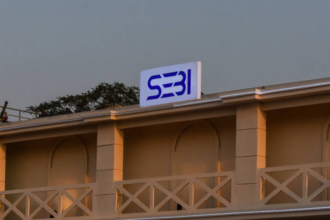Early Friday morning, a significant clash broke out as Israel started a deliberate aircraft campaign right into Iranian territory. Under the moniker Operation Rising Lion, the goal was to target Iran’s main military and nuclear sites. It set off rapid worldwide attention and signaled a major change in the long-standing tensions between the two countries. Reports of explosions abound in Tehran and other areas, including the vital nuclear plant at Natanz. As the government announced a national state of emergency, Israeli air raid sirens rang throughout several cities, triggering emergency warnings expected of impending Iranian reprisal.
- Which were the main targets, and what was destroyed?
- Why Would Israel Start the Israel-Iran Nuclear Strike Right Now?
- How has Iran responded to the attack?
- How has the Israel-Iran Nuclear Strike been received worldwide?
- What implications does this have for regional and worldwide security?
- Following the Strike: What Exactly?
- In essence, what does the world do now?
Initiated in response to mounting concerns inside Israel that Iran was approaching nuclear weapon capability with great proximity, the Israel-Iran nuclear attack, Prime Minister Benjamin Netanyahu claims that the strike was required to protect Israel’s existence against a near-nuclear danger. Presenting this as the first phase of a larger campaign meant to destroy Iran’s nuclear development, this operation was seen as…
Which were the main targets, and what was destroyed?
Considered fundamental to the defense and nuclear aspirations of Iran, the targets of the strike were nuclear experts and high-ranking military officers from the country. Israeli sources and Iranian official media verified that several high officials had passed away. Among them were Gholamali Rashid, commander of the Khatam-al Anbiya Central Headquarters, Mohammad Bagheri, chief of staff for the Iranian Armed Forces, and Hossein Salami, commander-in-chief of the Islamic Revolutionary Guards Corps. Two well-known nuclear physicists, Fereydoon Abbasi and Mohammad Mahdi Tehranchi, were also said to be deceased. Read another article on Iran Reacts to Hamas Assassination
Infrastructure suffered a lot of damage. Long considered the core of Iran’s uranium enrichment operations, the Natanz nuclear plant suffered major damage. This plant, which is about 225 kilometers south of Tehran, has previously been a focus of international worry. Later on, the International Atomic Energy Agency (IAEA) verified that the site was struck and declared it was under evaluation with Iranian authorities on radiation safety precautions.
Why Would Israel Start the Israel-Iran Nuclear Strike Right Now?
The Israel-Iran nuclear strike was timed deliberately, not by chance. Leaders of Israel feel that Iran has passed important nuclear development red lines. Iran has enriched uranium to 60% purity, according to a recent IAEA analysis—just short of the 90% needed for weapons-grade material. According to intelligence analyses, Iran has enough fissile material to perhaps create several nuclear bombs in a short period.
Prime Minister Netanyahu underlined in a nationally broadcast remark that the threat Iran presented was no longer theoretical. He said that Israel’s very life was threatened by Iran’s nuclear advancement right now. Netanyahu said categorically that Iran could create a viable nuclear weapon in less than a year, maybe within a few months, if not stopped. He underlined that Israel will not allow more Iranian progress and that Operation Rising Lion would continue as long as required to eliminate the nuclear danger.
How has Iran responded to the attack?
Though not yet matched by military action, Iran responded to the Israeli nuclear strike with quick and strong rhetoric. A spokesman for Iran’s military forces cautioned that what they considered to be an act of aggression would cost Israel and the United States dearly. Although the United States has denied any participation in the operation, Iranian officials keep linking the two countries and imply Washington shares indirect culpability.
Iranian military leaders promised openly to take reprisals. Tehran has made it plain that it regards the strike as a declaration of war, even if the shape and timing of a reaction are yet unknown. Notwithstanding mounting proof and international mistrust implying otherwise, the Iranian regime has also maintained that its nuclear program is only for benign, civilian uses.
Tension was raised even more by the IAEA’s latest resolution charging Iran with breaching its non-proliferation responsibilities. This was the first official agency violation declaration in two decades, referencing Tehran’s consistent inability to completely provide nuclear materials and procedures. These results support Israel’s contention that military action was required to stop Iran from acquiring nuclear capability.
How has the Israel-Iran Nuclear Strike been received worldwide?
Variations in international responses reflect the complexity of the circumstances. The Foreign Minister of Australia openly voiced concern, warning that the operation ran the danger of upsetting an already unstable area. She demanded moderation and underlined the need for diplomatic involvement above military escalation.
Although it is still supporting Israel’s right to defend itself, the United States has formally separated from the strikes. Marco Rubio, the Secretary of State, attested to the fact that the United States did not support the operation and that safeguarding American soldiers stationed in the Middle East remained the top priority. He underlined the need for de-escalation as well and advised all sides to stay away from more military conflict.
The IAEA has sent inspection teams to evaluate damage at Iran’s nuclear sites and guarantee adherence to containment procedures concurrently. In an attempt to avert a more general war, several nations are now requesting emergency diplomatic negotiations under United Nations auspices.
What implications does this have for regional and worldwide security?
The Israel-Iran nuclear strike has fundamentally changed the Middle East strategic terrain. Israel’s readiness to launch preemptive strikes against highly valuable Iranian targets points to a fresh phase in regional security posture. Simultaneously, the incident has alarmed people about the possibility of a larger battle including Gulf nations, Syria, and Lebanon.
The tragedy also gives nuclear non-proliferation initiatives fresh importance. Many foreign observers contend that the events show how poorly current diplomatic systems can restrain Iran’s nuclear aspirations. Before tensions spiral even more out of control, the world community is under increasing pressure to support monitoring, inspection, and enforcement systems.
Following the Strike: What Exactly?
Iran’s reaction will determine much of the way forward. Should Tehran decide on a direct military reprisal, the area may quickly enter a more general confrontation. Some reports, however, claim that backchannel diplomatic talks are underway, meant to help defuse conflict and stop a second wave of attacks.
Israel has said, for their part, that should Iran not stop its nuclear program, more strikes are likely. Reportedly ready for protracted operations, Israeli defense authorities also carefully coordinate with important partners to get ready for possible reprisal.
Global diplomatic activities are intensifying concurrently. Pressing both Israel and Iran to show moderation are UN officials and diplomats from important foreign nations. Although there is yet a window for peaceful resolution, it calls for a quick and coordinated worldwide response.
In essence, what does the world do now?
A turning point with great consequences for world security is the Israel-Iran nuclear strike. The world community has to move quickly to bring diplomatic communication back under control and implement non-proliferation policies. To stop the start of full-scale war, a concerted effort including regional and worldwide players is desperately required.
Time is vital. The world might be headed toward a conflict with disastrous results without fast de-escalation and fresh dedication to diplomacy. While turning the course is not too late, doing so will call for world community unity, leadership, and bravery.








